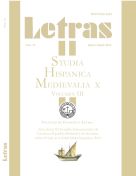Por favor, use este identificador para citar o enlazar este ítem:
https://repositorio.uca.edu.ar/handle/123456789/3881| Campo DC | Valor | Lengua/Idioma |
|---|---|---|
| dc.contributor.author | Cuellar, Claudio R. | es |
| dc.date.accessioned | 2019-06-01T18:07:30Z | - |
| dc.date.available | 2019-06-01T18:07:30Z | - |
| dc.date.issued | 2016 | - |
| dc.identifier.citation | Cuellar, Claudio R. “Registro y tradición fabulística : el caso del lobo, la zorra y el simio” [en línea]. Letras, 73 (2016). Disponible en: https://repositorio.uca.edu.ar/handle/123456789/3881 | es |
| dc.identifier.issn | 0326-3363 | - |
| dc.identifier.uri | https://repositorio.uca.edu.ar/handle/123456789/3881 | - |
| dc.description.abstract | Resumen: El objetivo de este artículo es analizar la finalidad que se le otorga al uso del argot legal y del conocimiento del derecho romano y castellano en dos fuentes que relatan un proceso judicial por robo: por un lado, el episodio sobre el pleito que sucedió entre el lobo, la raposa y el mono en el Libro de Buen Amor (321-371);1 y por el otro, analizaremos la versión latina en la que indirectamente se inspiró el Arcipreste de Hita, la fábula Lupus et vulpes iudice simio (Pha. Ae. X) escrita por Fedro. Y dado que se estudia el registro para determinar la recepción del derecho romano y castellano en los autores mencionados, usaremos —al solo efecto metodológico— la gramática sistémico-funcional, en lo referente a colocación y campo, tenor y modo. | es |
| dc.description.abstract | Abstract: This article aims to analyze the purpose that is granted to the legal argot and the knowledge of the Roman and Spanish law in two sources that describe a judicial process by theft: on the one hand, the episode on the lawsuit that happened between the wolf, the fox, and Don Ximio in the Libro de Buen Amor (321-371); and on the other hand, the roman version which indirectly inspired the Arcipreste de Hita, the fable “Lupus et vulpes judice simio” (Pha. Ae. X) written by Fedro. Since we study the log to determine the reception of Roman and Spanish law in the above-mentioned authors, we use the systemic-functional grammar concepts of placement, field, tenor, and mode as methodological tools. | es |
| dc.format | application/pdf | es |
| dc.language.iso | spa | es |
| dc.publisher | Universidad Católica Argentina. Facultad de Filosofía y Letras | es |
| dc.rights | Acceso Abierto | es |
| dc.rights.uri | https://creativecommons.org/licenses/by-nc-sa/4.0/ | es |
| dc.source | Letras Nº 73, 2016 | es |
| dc.subject | LITERATURA ESPAÑOLA | es |
| dc.subject | LITERATURA MEDIEVAL | es |
| dc.subject | FABULAS | es |
| dc.subject | DERECHO ROMANO | es |
| dc.subject | GRAMATICA | es |
| dc.title | Registro y tradición fabulística : el caso del lobo, la zorra y el simio | es |
| dc.title | Record and fabulistic tradition : the case of the wolf, the fox, and the monkey | es |
| dc.type | Artículo | es |
| uca.path | Letras|2016 nº 73 | es |
| uca.disciplina | LITERATURA | es |
| uca.filename | /home/data-uca-generic/folder_generic/letras73/registro-tradicion-fabulistica-cuellar/metadata.xml | es |
| uca.issnrd | 1 | es |
| uca.affiliation | Fil: Cuellar, Claudio R. Instituto Superior del Profesorado “Dr. Joaquín V. González”; Argentina | es |
| uca.orden | 09 | es |
| uca.version | publishedVersion | es |
| item.languageiso639-1 | es | - |
| item.grantfulltext | open | - |
| item.fulltext | With Fulltext | - |
| Aparece en las colecciones: | LETRAS - 2016 nro. 73 | |
Ficheros en este ítem:
| Fichero | Descripción | Tamaño | Formato | |
|---|---|---|---|---|
| registro-tradicion-fabulistica-cuellar.pdf | 87,67 kB | Adobe PDF |  Visualizar/Abrir |
Visualizaciones de página(s)
274
comprobado en 30-abr-2024
Descarga(s)
102
comprobado en 30-abr-2024
Google ScholarTM
Ver en Google Scholar
Este ítem está sujeto a una Licencia Creative Commons

